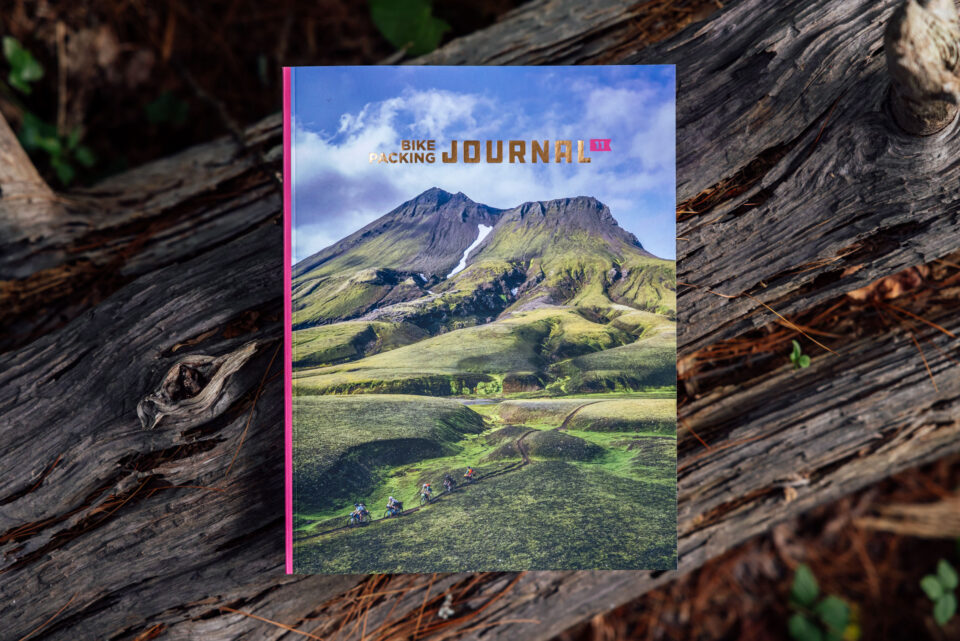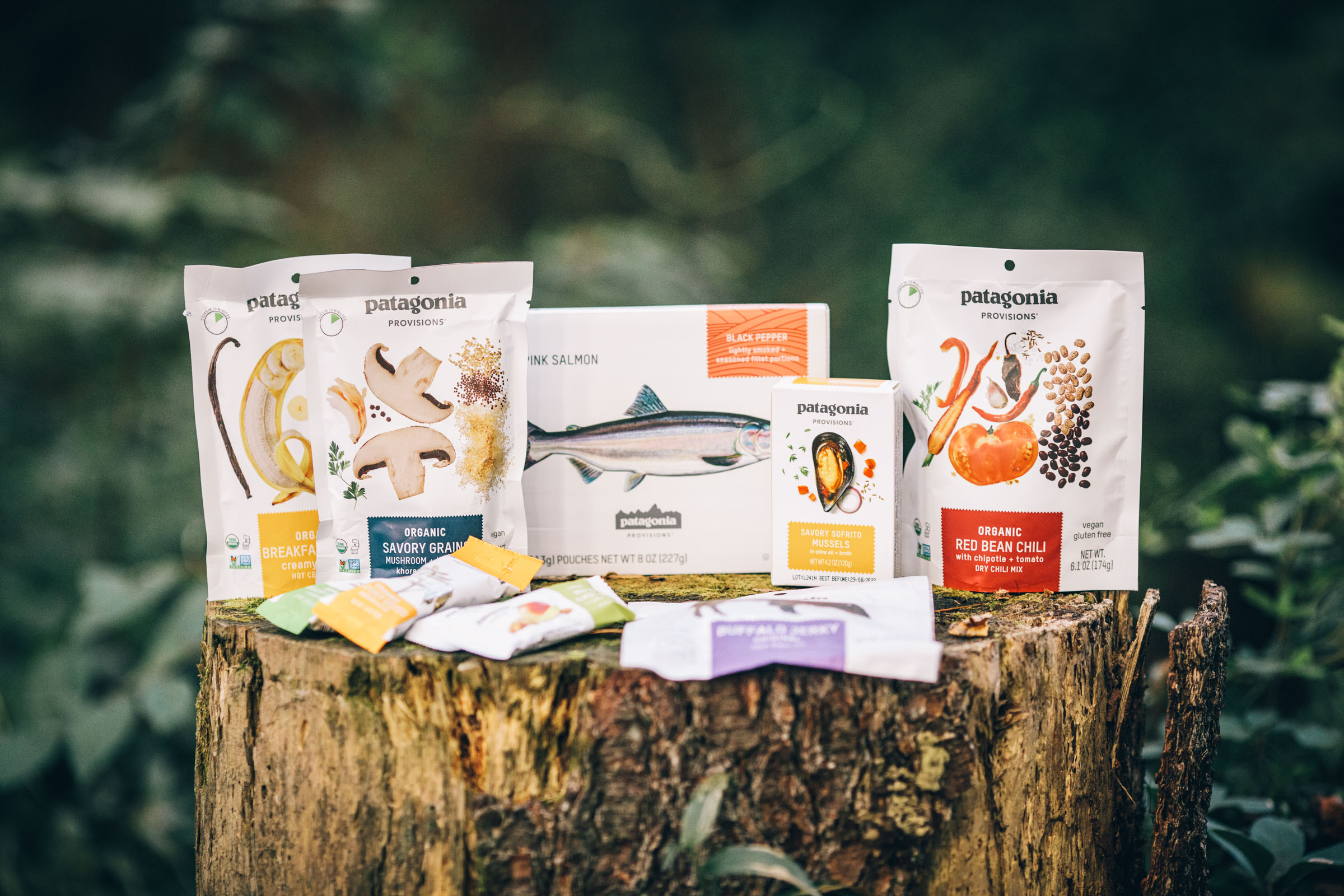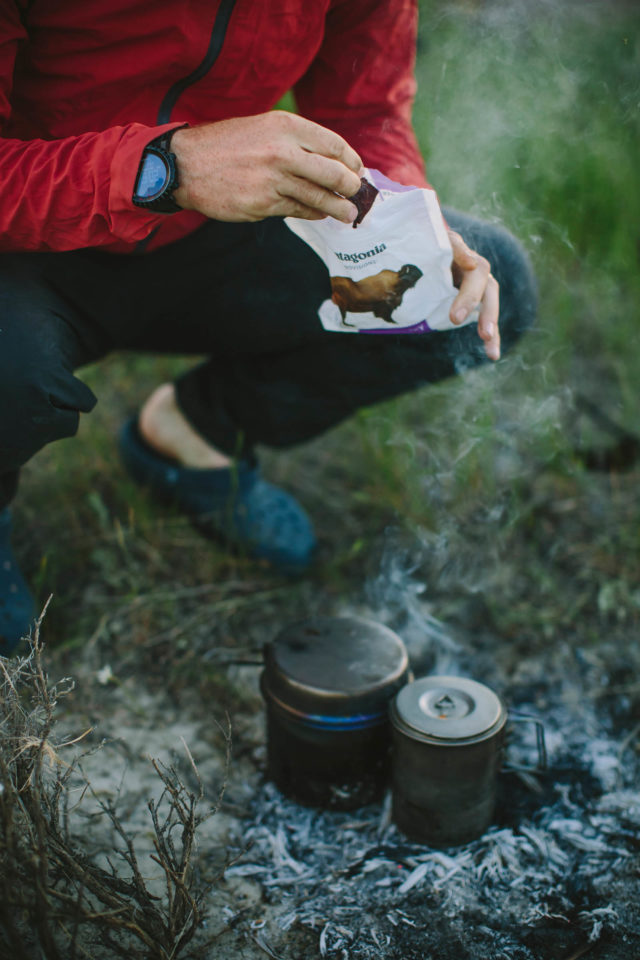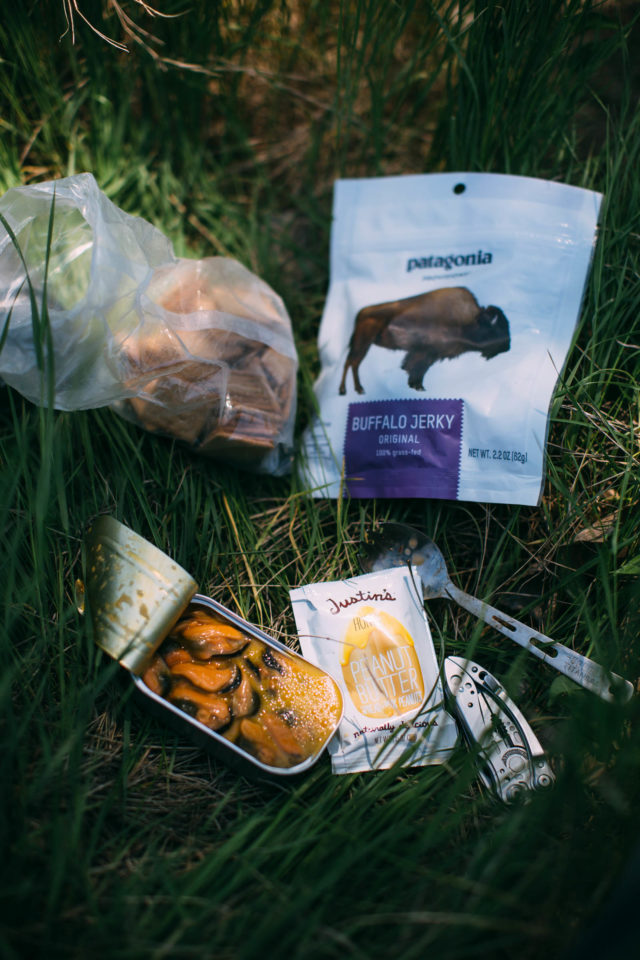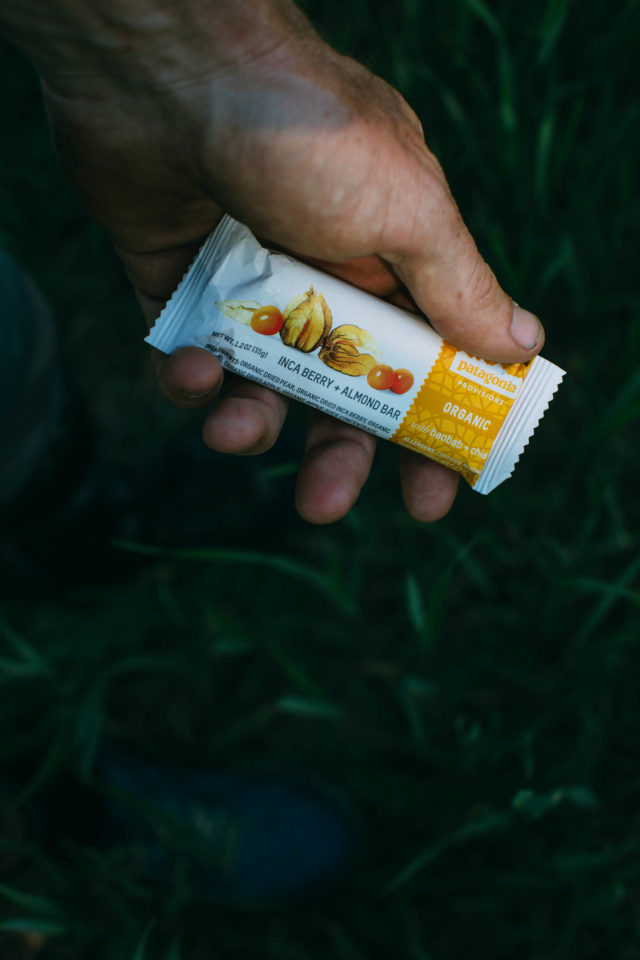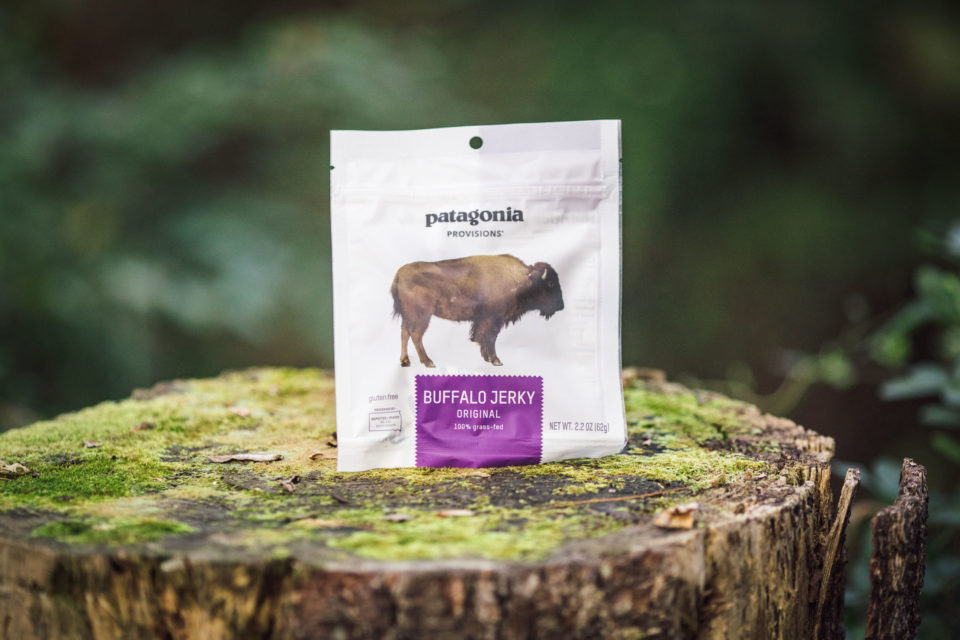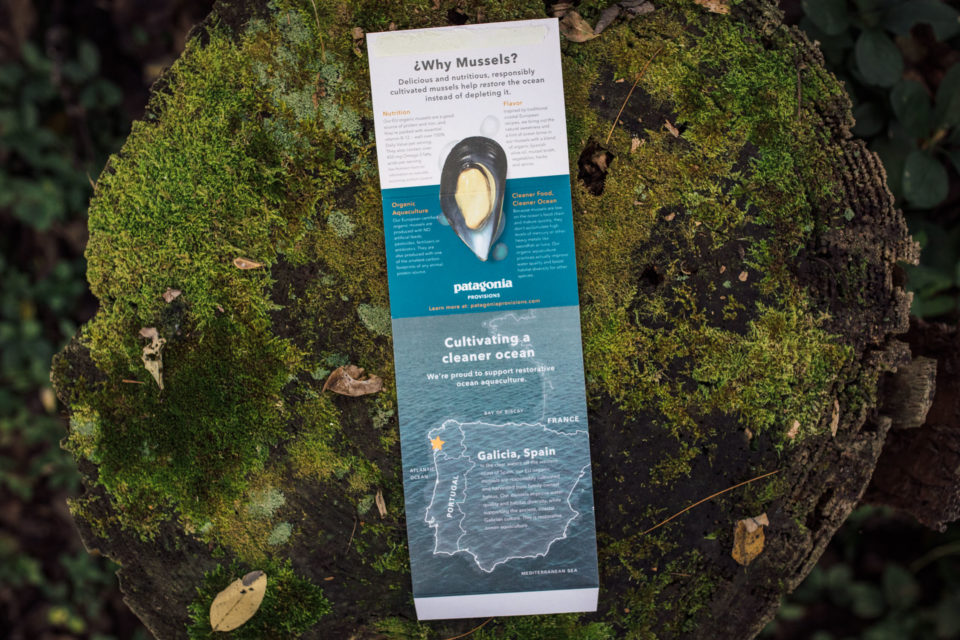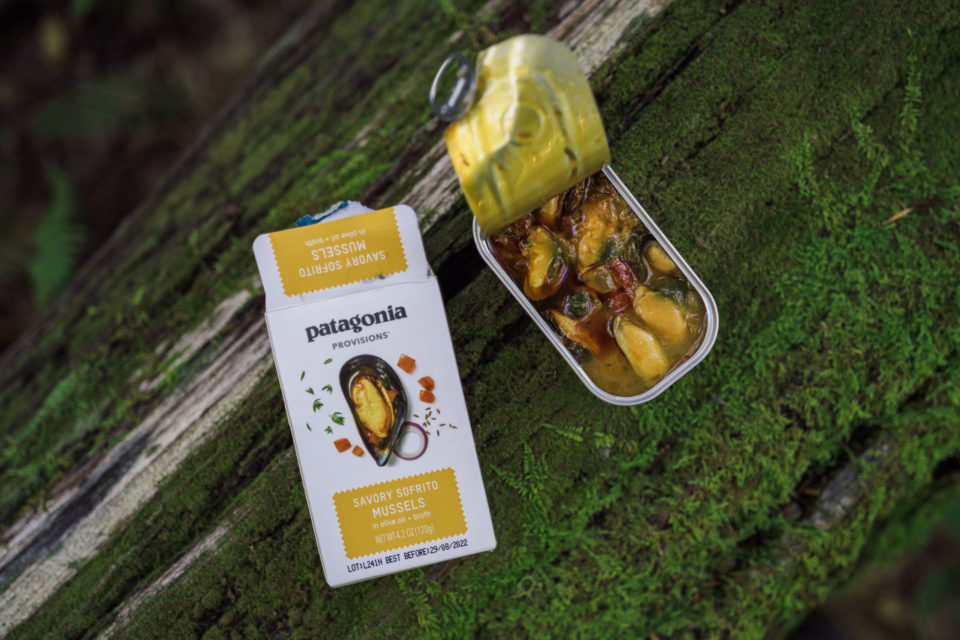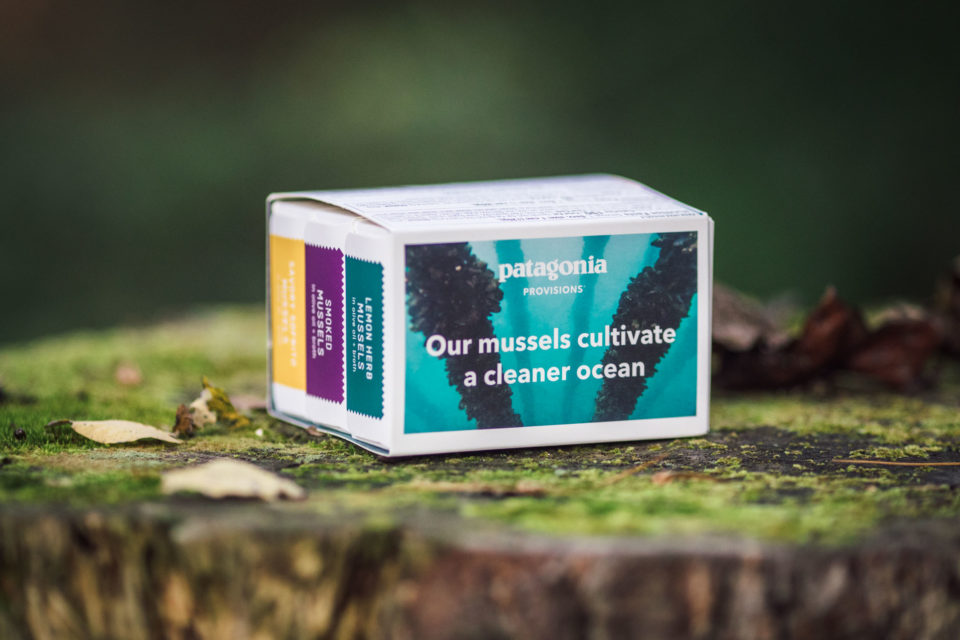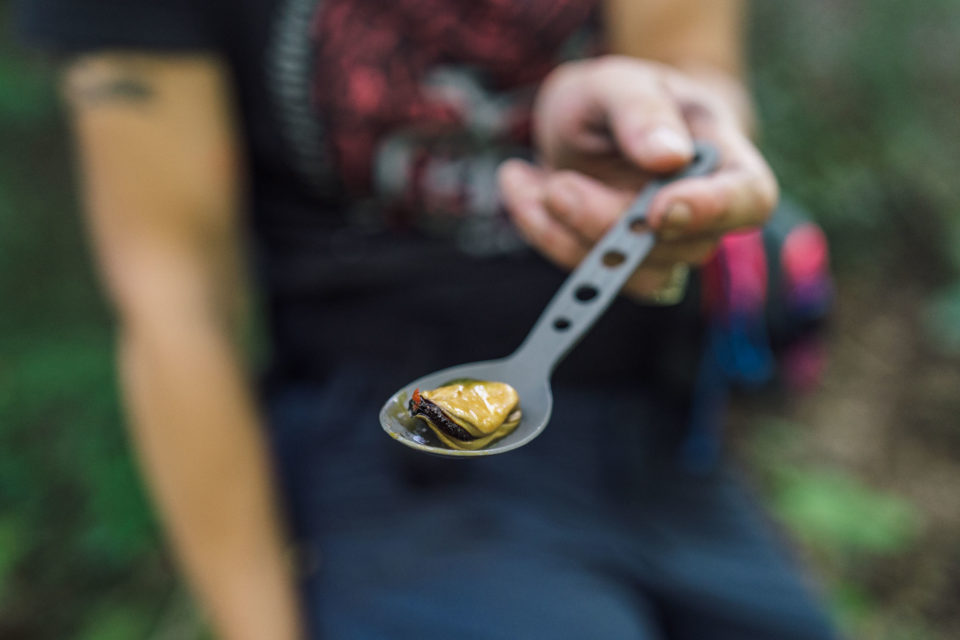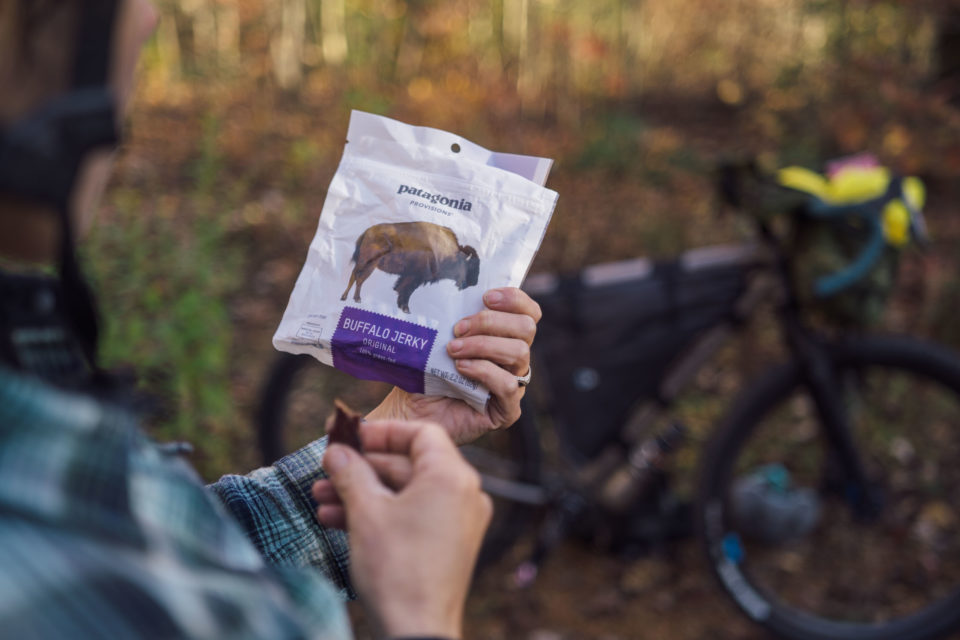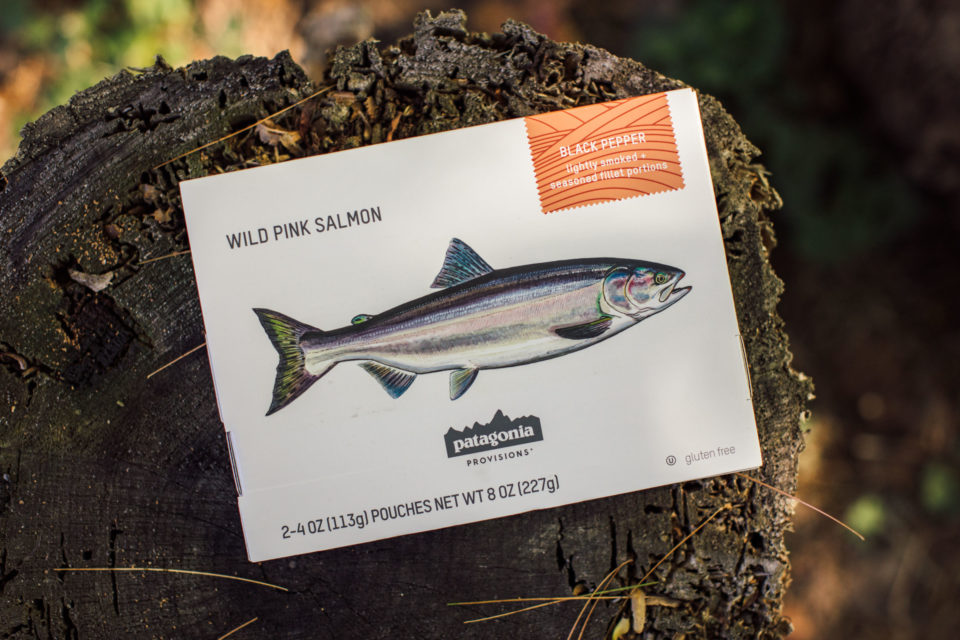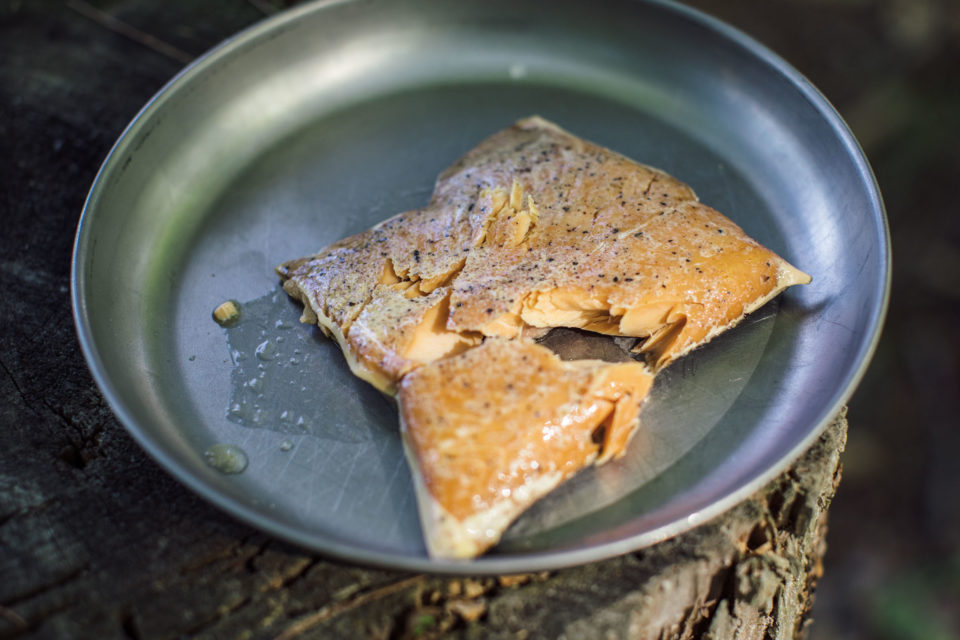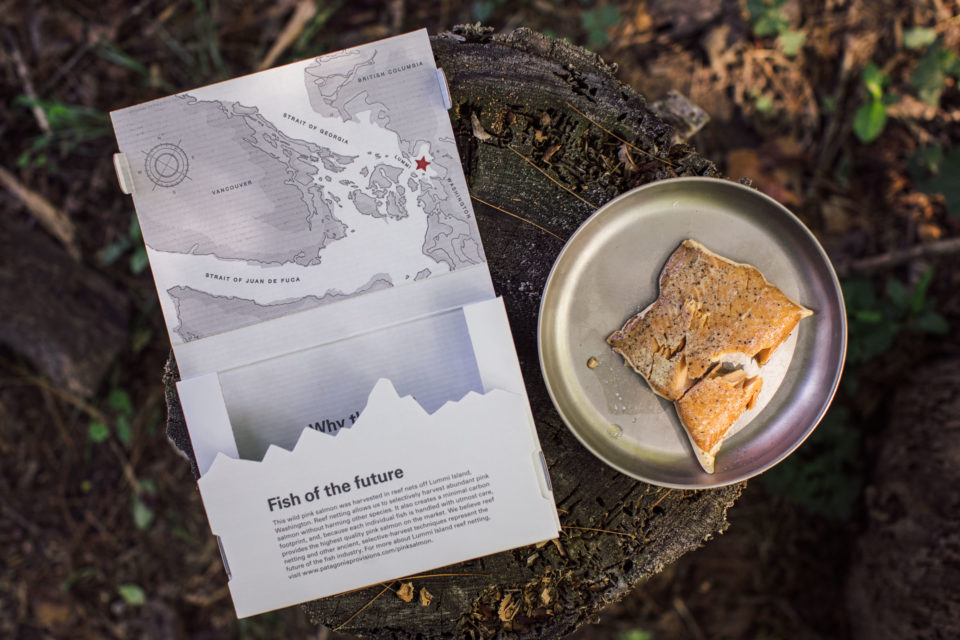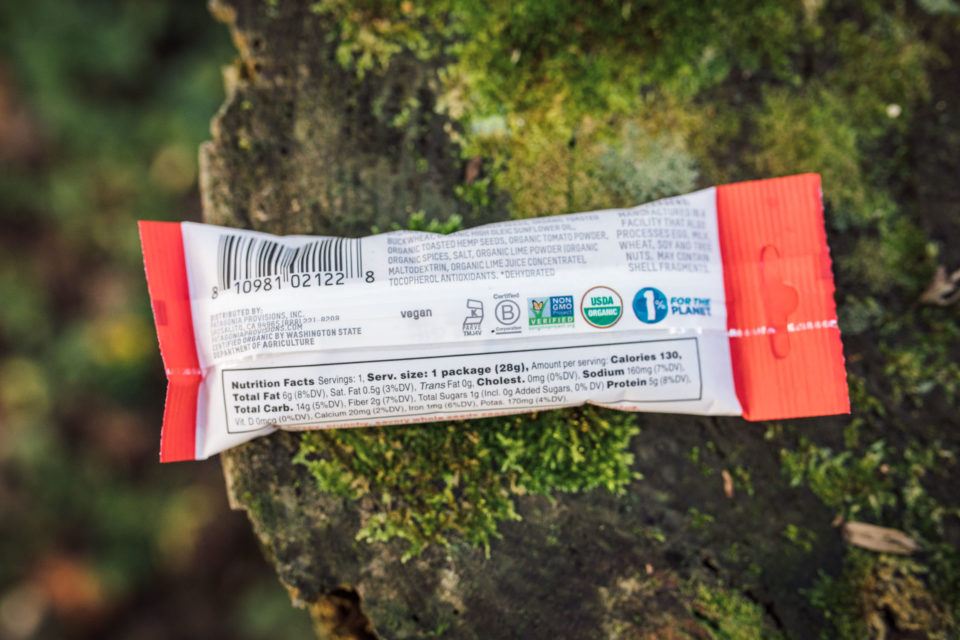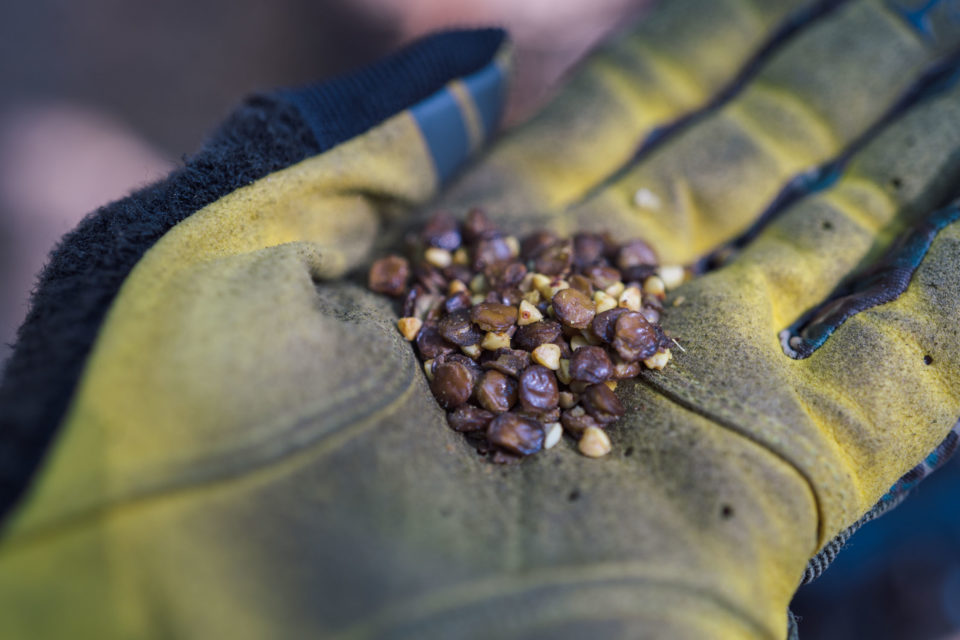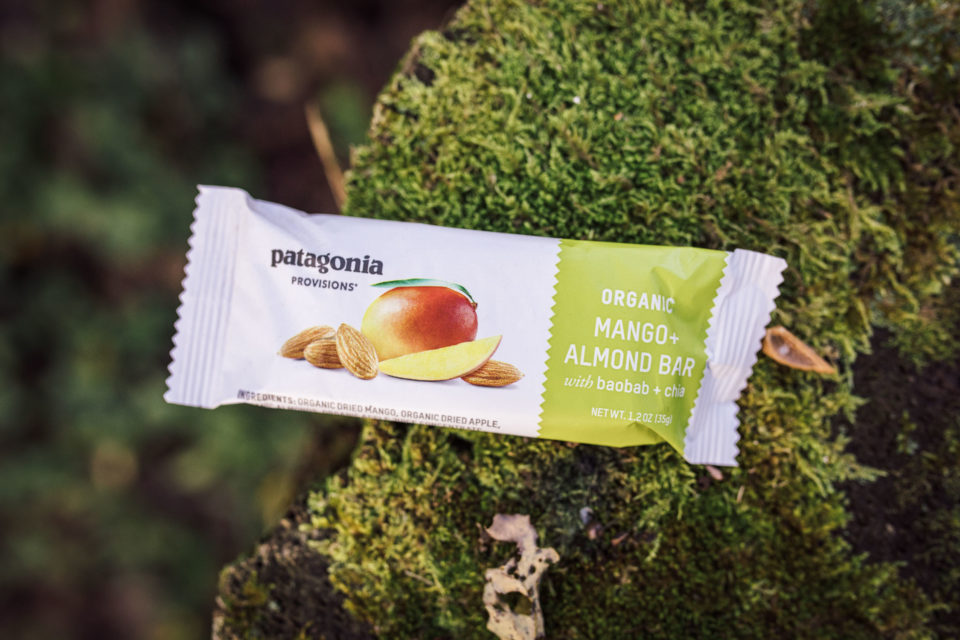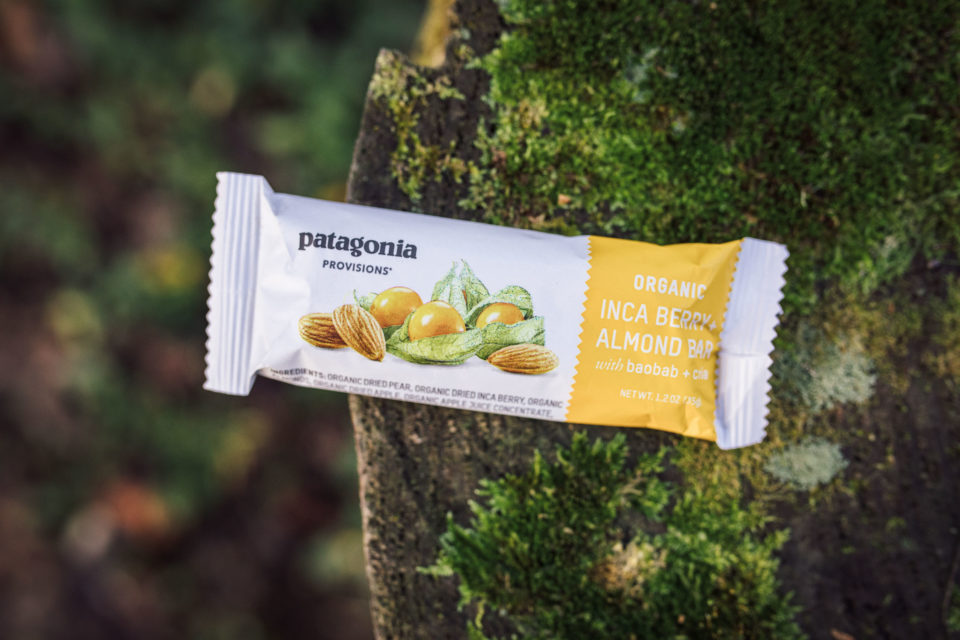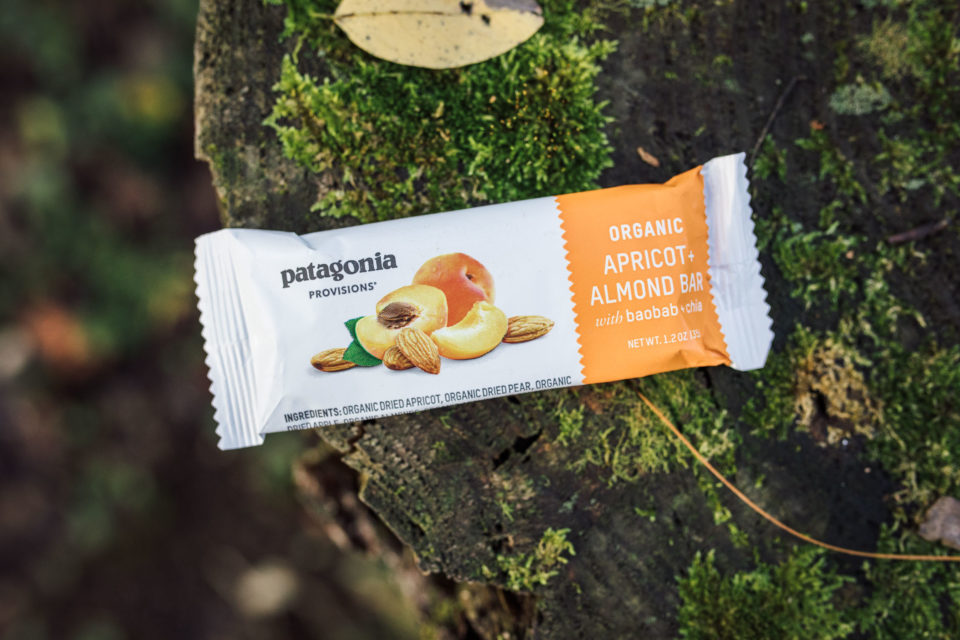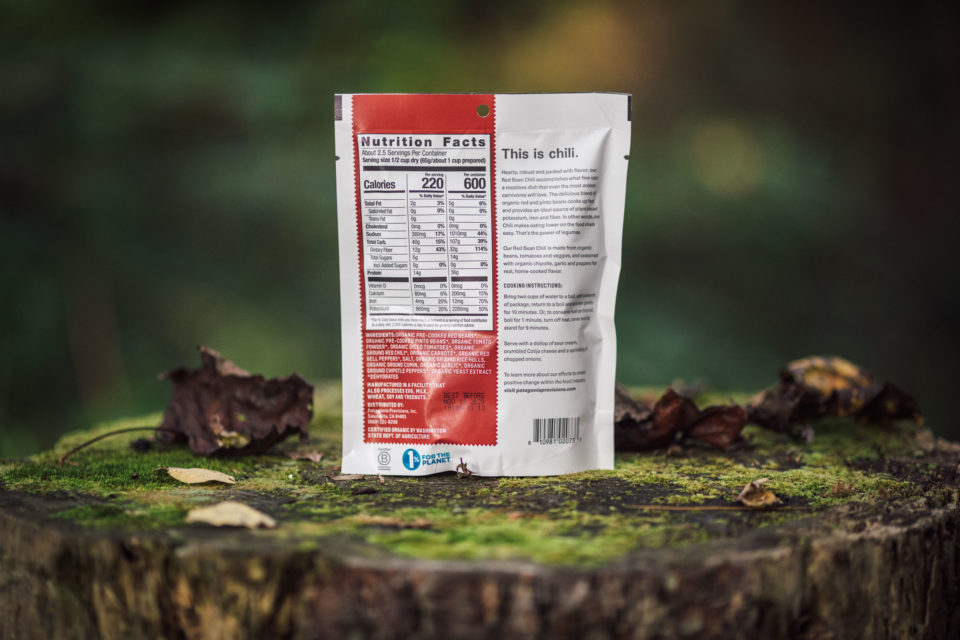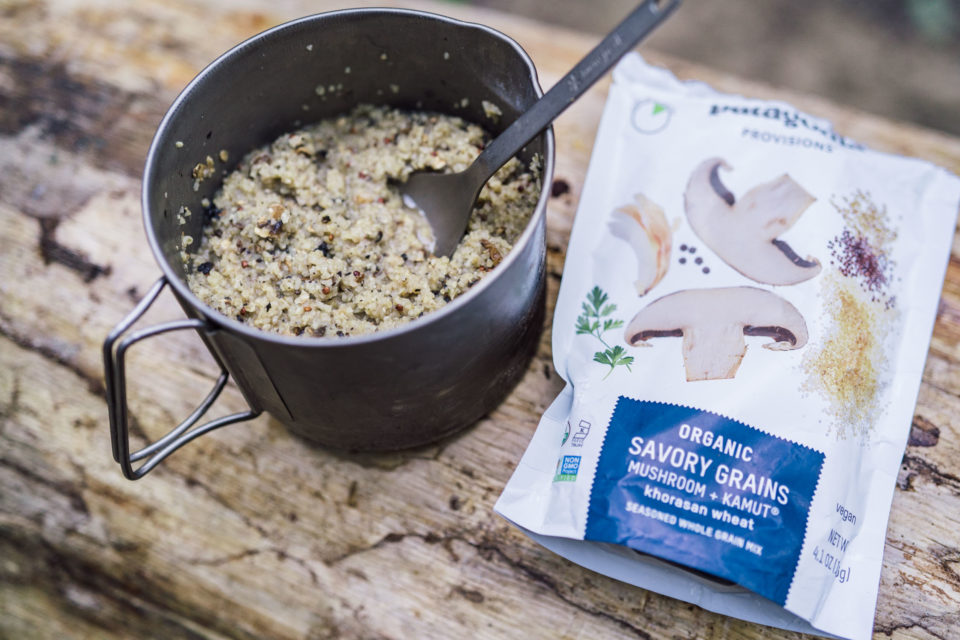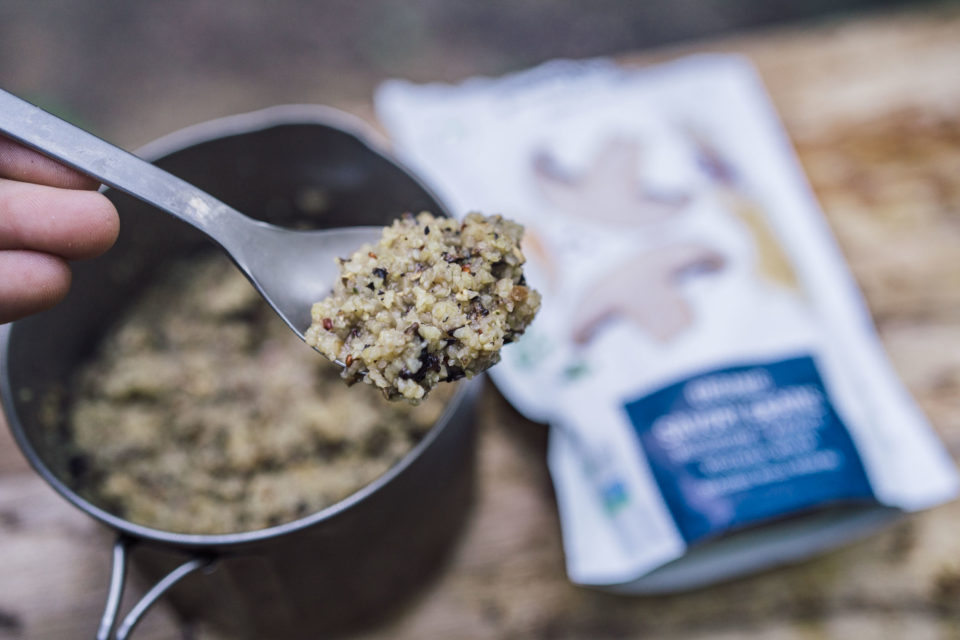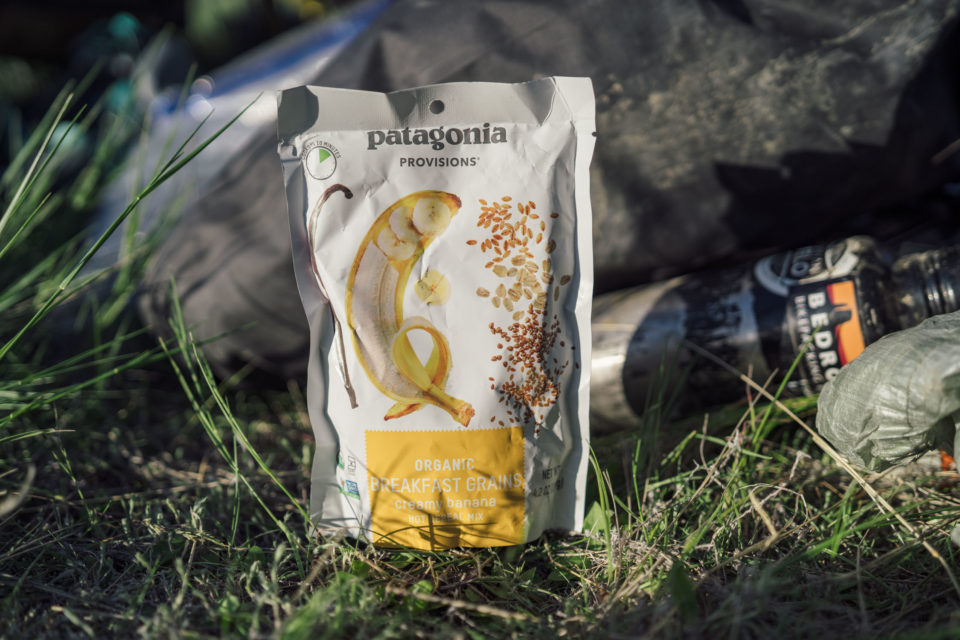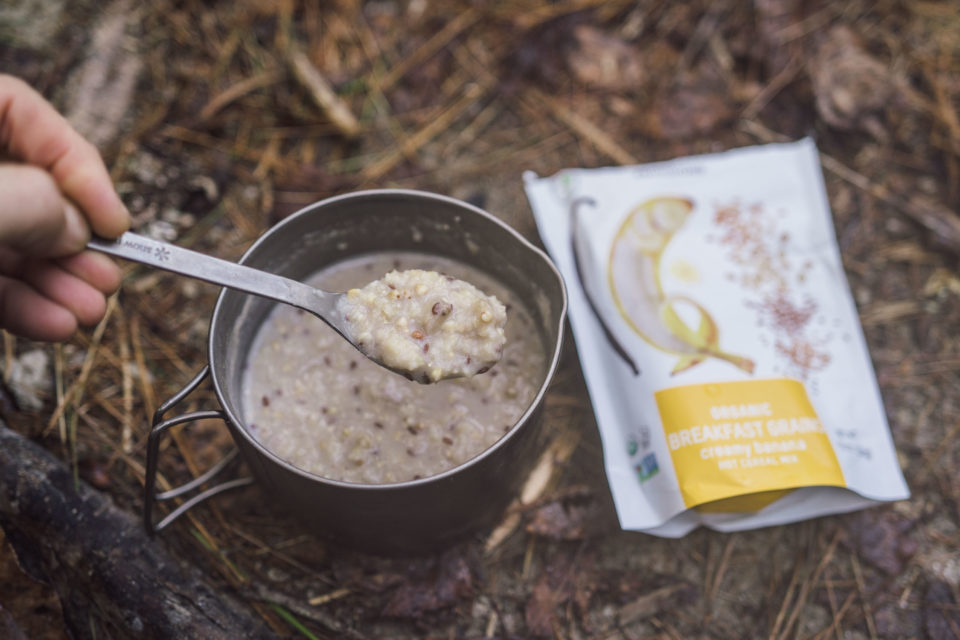Patagonia Provisions Review: Food With a Story
Patagonia Provisions sent us a box of samples to help fuel a few bikepacking trips over the last year. While one might think that this is just another high-end, pre-packaged camp food brand, there’s a bigger story behind each of Patagonia’s meals, snacks, and seafood products. Here’s our full review…
PUBLISHED Jul 14, 2020
Words by Virginia Krabill and Logan Watts; photos by Logan Watts and Joel Caldwell
If you have read our recent article, Ways to Save Money on Bikepacking Food, you know that we are proponents of do-it-yourself meal preparation. There’s no better, or less expensive, way to eat healthy, flavorful, and customizable meals than by cooking them yourself. We also prefer snacks that don’t come in individual, single-use plastic packaging. That said, there are occasions when people don’t have time to thoughtfully prepare a full bikepacking meal plan, and the convenience of pre-packaged meals becomes irresistible. Fortunately the camp food industry has evolved over the years, and now there are countless companies making high-quality, delicious outdoor-specific food that meets dietary restrictions and demands of all sorts: organic, gluten, soy, and dairy-free, vegetarian/vegan, and paleo. Some of them are also making more earth-friendly options from locally-sourced (relative to the manufacturer) ingredients, sustainably-caught seafood, and free-range animals. While all of these companies’ efforts are commendable, there is one not-so-small company that seems to have set the bar in terms of sustainably-sourced, pre-packaged foods…
Patagonia was a pioneer in the corporate social responsibility movement, and they continue to be a leader in many ways. They continually adapt their strategies and implement new initiatives and policies aimed at improving conditions and wages for the individuals who work in their supply chain factories. Patagonia also raised the bar for environmentally responsible production, starting with their transition to all organic cottons back in the 90s. In more recent years, they have moved toward 100% renewable and recycled raw materials. They contribute substantial sums of money to grassroots environmental organizations and have fought tirelessly for public land protections. When the company launched Patagonia Provisions in 2012, they, once again, put their do-gooder ethos to work—only this time, they literally “put their money where their mouth [was].”
When they first started their Provisions line, it seemed like quite a leap for the outdoor apparel company. After all, what does a puffy jacket or thermal underwear have in common with food? The answer to that question can be found in the company’s mission statement: “Patagonia is in business to save our home planet” (and not just to outfit rock climbers). As many of you may know, conventional/industrial agriculture is one of the biggest contributors to global climate change. As such, Yvon Chouinard, Patagonia’s founder, decided that investing in the food industry was one way in which his company might have a very positive and potentially profound effect on the environmental crisis. To that end, Patagonia Provisions supports farmers who use regenerative organic agriculture techniques as well as fisherpeople who practice sustainable harvesting. In other words, they encourage and fund food production done “the right way.” Maybe even more importantly, the company hopes their work will inspire more innovative solutions to the climate crisis and a commitment by more corporations to join in the fight to save our planet.
Ethics Aside…
It feels good to support a company that’s doing the ”right” thing, but feeding our egos isn’t the same thing as feeding our bodies. For long days in the saddle, we need energy, and, no matter the occasion, we want the foods we eat to actually taste good. Fortunately, with the Patagonia Provisions that we have sampled, there’s no need to compromise on taste or nutritional value for the sake of being a responsible consumer.
For the purpose of this review, we received a wide variety of products from Patagonia Provisions. Every item we sampled was clearly of high quality, with ingredient lists that are short and familiar, but still unique. The flavors were consistently pleasing, with a careful balance of tastes and aromas. Most importantly, each product tells an interesting story about its ingredients. While we’ve enjoyed all of the selections we’ve tested, there are definitely some that standout from the rest.
Meat and Seafood
Seafood takes a prominent position in the Patagonia Provisions lineup, where salmon, mussels, and mackerel are all featured. We have yet to sample the mackerel, but the salmon and mussels are impressive.
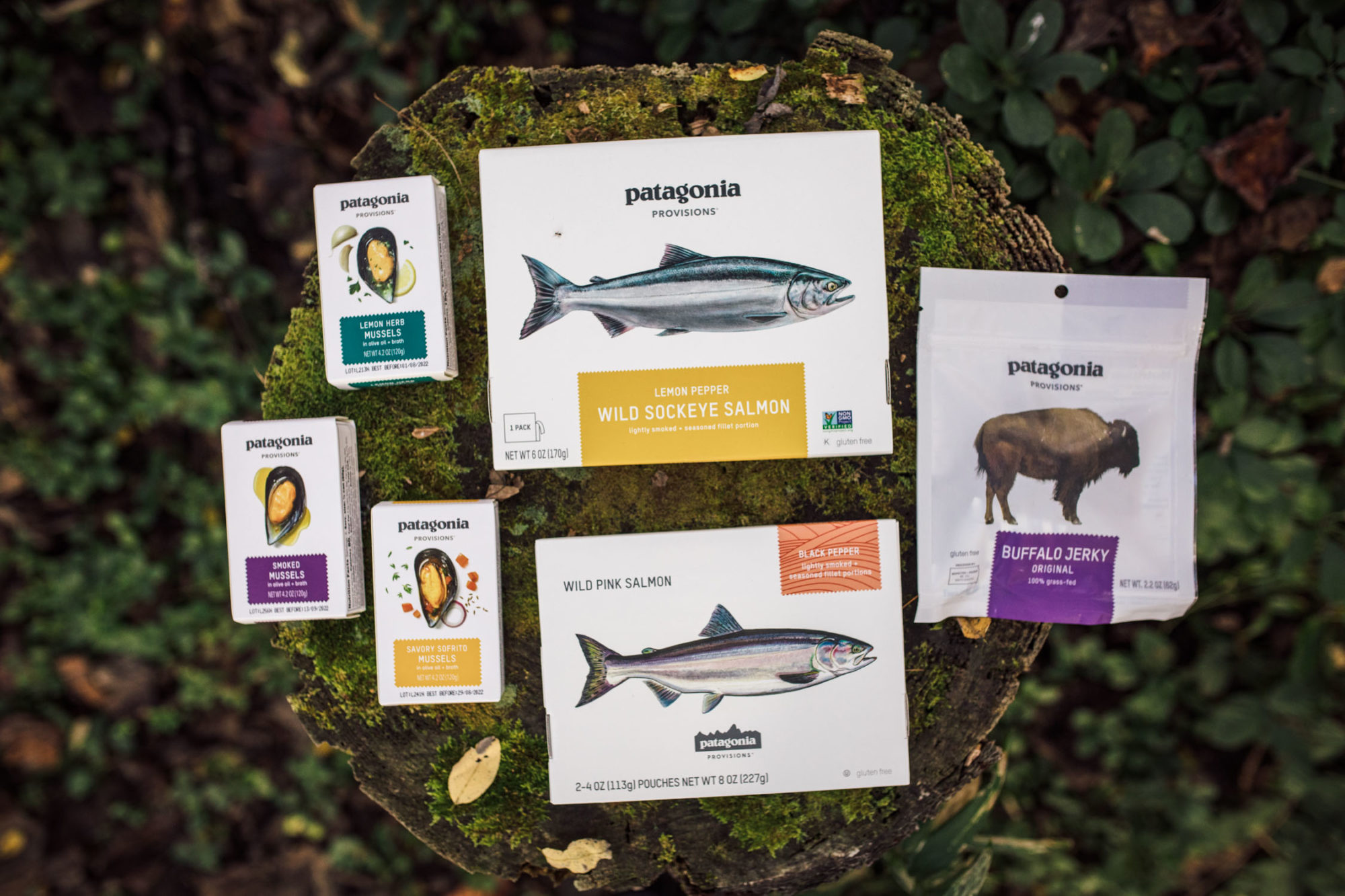
Mussels
Mussels, by their very nature, benefit the waters in which they grow. They filter carbon and nitrogen out of water, and, when farmed, provide essential habitats for other species. Patagonia Provision’s mussels are, not surprisingly, raised and harvested using sustainable and organic farming practices that additionally benefit the health of the oceans in which they are grown. Aside from their environmental benefits, mussels are a great source of protein, omega-3 fats, and vitamin B-12. What’s more, they’re delicious.
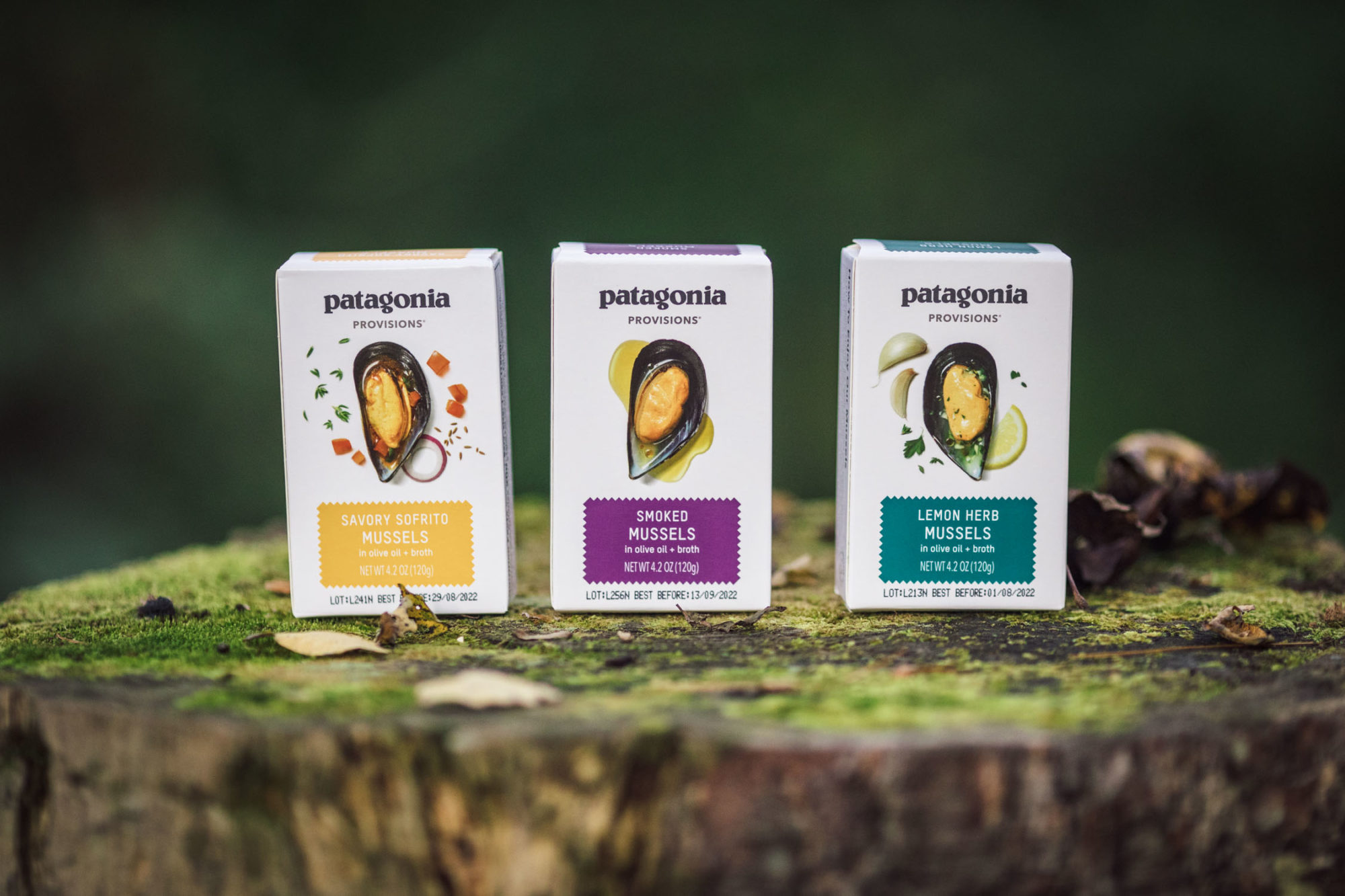
Patagonia Provision’s mussels come in three flavors: Smoked, Lemon Herb, and Savory Sofrito. All of the varieties are finished in organic olive oil and a mussel broth that accentuates the subtle flavor and brininess of the mussels themselves. They are all delicious, but the Lemon Herb are our favorite. They are delicately seasoned with parsley, thyme, onion, and black pepper. The lemon is not overwhelming, but it adds nice brightness and balance to the more earthy flavors of the herbs. The Sofrito is a close second. Both were certainly fought over at camp and made a nice portion-rich post-ride snack.
They aren’t cheap, but if you want to treat yourself sometime, the variety 3-pack sells for $20 on PatagoniaProvisions.com, while each individual flavor is available in single 4.2 ounce (120 gram) cans for $7 (Lemon Herb, Savory Sofrito, Smoked).
Buffalo jerky
An animal-based jerky that we can actually feel (pretty) good about eating. The buffalo for this jerky is sourced from free-roaming bison. The prairie grasslands from whence they come actually benefit from the regenerative grazing techniques that are employed by Wild Idea Buffalo ranchers. As it happens, Wild Idea is affiliated with the very same projects highlighted in our Prairie Breaks bikepacking route, supporting Nature Conservancy herds and Native American ranchers. What’s more, the bison are “humanely” harvested in the field versus being shipped to a slaughterhouse.
Best of all, this jerky is delicious. It’s only a touch sweet and the garlic is used judiciously. It’s got the right amount of salt—enough to make the mouth water but not so much that it overwhelms any other flavors. The pepper flavor is subtle. For our tastes, the pepper could be amped up a little, but for more sensitive palettes, it’s probably perfect. In terms of texture, the jerky is firm, but not leather-hard, providing a nice, satisfying chew. All-in-all, this jerky may be worth wrestling over (at least that’s what we thought).
A 2.2oz package of the buffalo jerky sells for $10. The price is a bit steep when compared to the cheapest factory-raised options on the market, but when compared to other manufacturers’ grass-fed or wild game jerky, any difference in price is minimal.
Salmon
The salmon options include wild sockeye from Alaska, wild pink from Washington, and a limited-supply of Pacific Northwest (Washington) wild sockeye. All of the fish are caught using “selective-fishing” techniques of only the most abundant species. Patagonia works with fish biologists and conservationists to ensure that the harvest techniques remain sustainable. They also financially support many conservation projects that directly impact wild salmon as well as organizations that are working to shut down harmful hatcheries and improve the practices of commercial fisheries.
We tried the Lemon Pepper Wild Sockeye Salmon and the Black Pepper Wild Pink Salmon. They were both delicious. Unfortunately, like the mussels and jerky, a single $14 package is comparable in price of an entire (and pretty fancy) meal, but at 300-390 calories per package, it’s not enough to stand alone as one. Aside from taste, the best part about it is that it packs a massive dollop of protein (39 grams in the 6oz single packet of Wild Sockeye), which is great for muscle recovery after a long ride. Our favorite was the Black Pepper Wild Pink Salmon. For $14 it comes with two 4oz filet packages, each with 24 grams of protein and 180 calories.
Snacks
In addition to the Buffalo Jerky, Patagonia Provisions offers a few other handy snacks. Here are the two we tried.
Savory Seeds
Patagonia Provisions Organic Savory Seeds are a combination of toasted and roasted lentils, buckwheat, hemp, and sunflower or pumpkin seeds. These plants and those that produce the seeds improve the health of the soil in which they grow and support “regenerative” agriculture. For example, the lentils serve as cover crops, which provide natural fertilizer and help sequester atmospheric carbon, while buckwheat naturally suppresses weeds and helps control erosion.
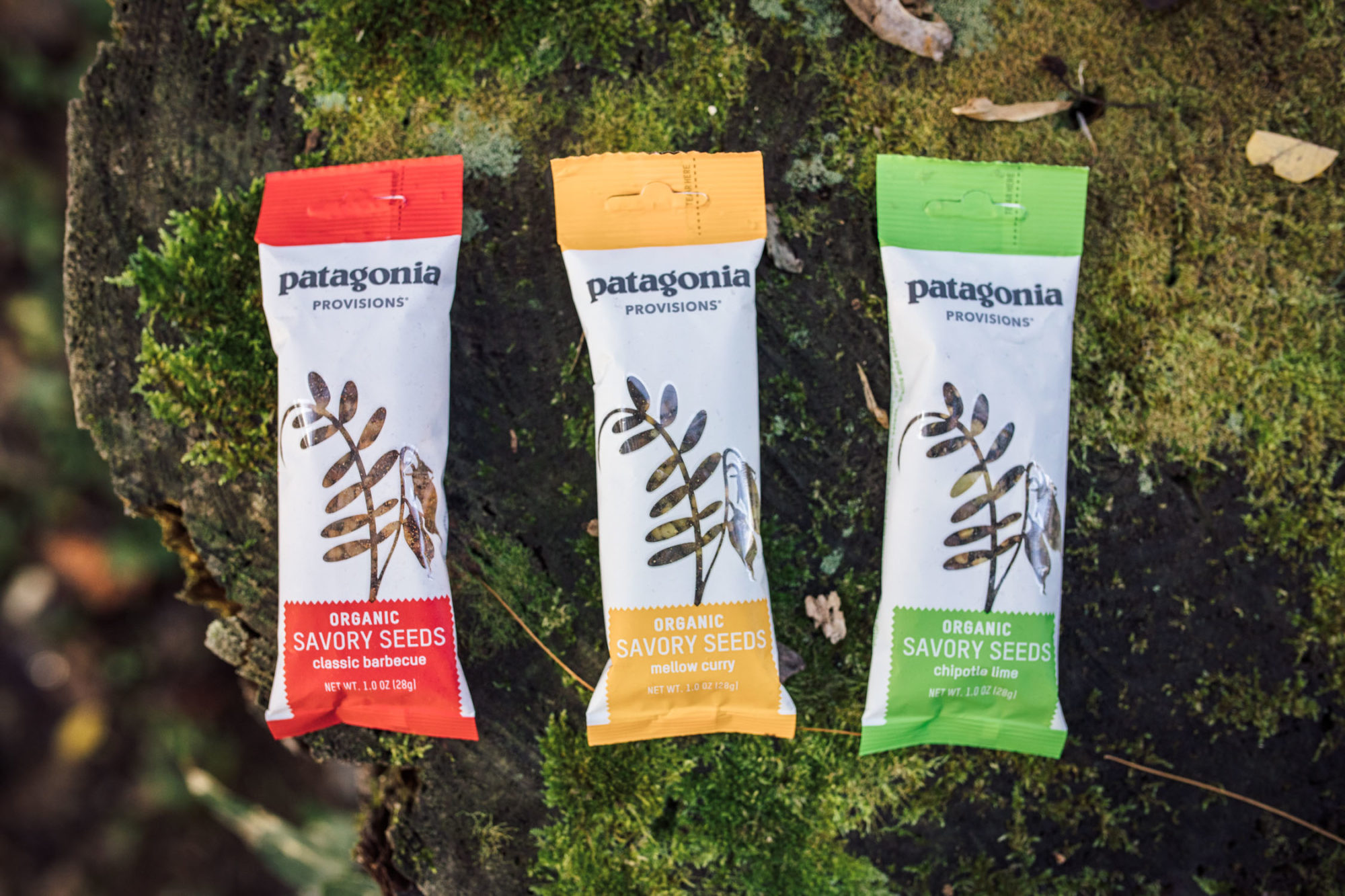
Savory Seeds come in three flavors: Chipotle Lime, Classic Barbecue, and Mellow Curry. Each 1oz packet serves up 130 calories and 6 grams of protein. They are similar to cocktail peanuts in their saltiness, but they are decidedly crispier. All of the flavors are really tasty, so it’s difficult to decide on a clear favorite. The chipotle lime are pleasantly zesty with just a hint of the earthy chipotle warmth. The barbecue are loaded with smoky flavor and a touch of sweetness. The curry flavor is typical of a mild yellow Indian curry, earthy but without any peppery heat. The curry seeds seem a bit drier than the other two varieties, almost a little astringent, but their flavor is really satisfying.
On Patagonia Provisions website, the Savory Seeds are sold in 12-packs (each pouch weighing 1 oz) of a single flavor or in a variety 12-pack, that include 4 pouches of each flavor. One box of the single flavor packs sells for $24 (Chipotle Lime/Classic Barbecue/Mellow Curry). A discount is provided when more than 1 box is purchased. Three boxes of the variety 12-pack sells for $72. At present, single boxes are unavailable for purchase. At approximately $2 per pouch, the Savory Seeds are comparable in price to most energy bars or gels on the market.
Energy Bars
Some of our favorite snacks in Patagonia Provisions’ line were the Organic Fruit and Almond Bars. Each of these chewy bars is made with organic mangoes and other fruits, plus roasted almonds and chia seeds to add a bit of a crunch. Each bar is quite small and packs a decent amount of calories into a relatively minuscule package. Patagonia Provisions Bars come in three fruit mixes, Organic Mango + Almond, Organic Inca Berry + Almond, and Organic Apricot + Almond. Each have a mix of interesting ingredients such as other dried fruits and baobab fruit powder.
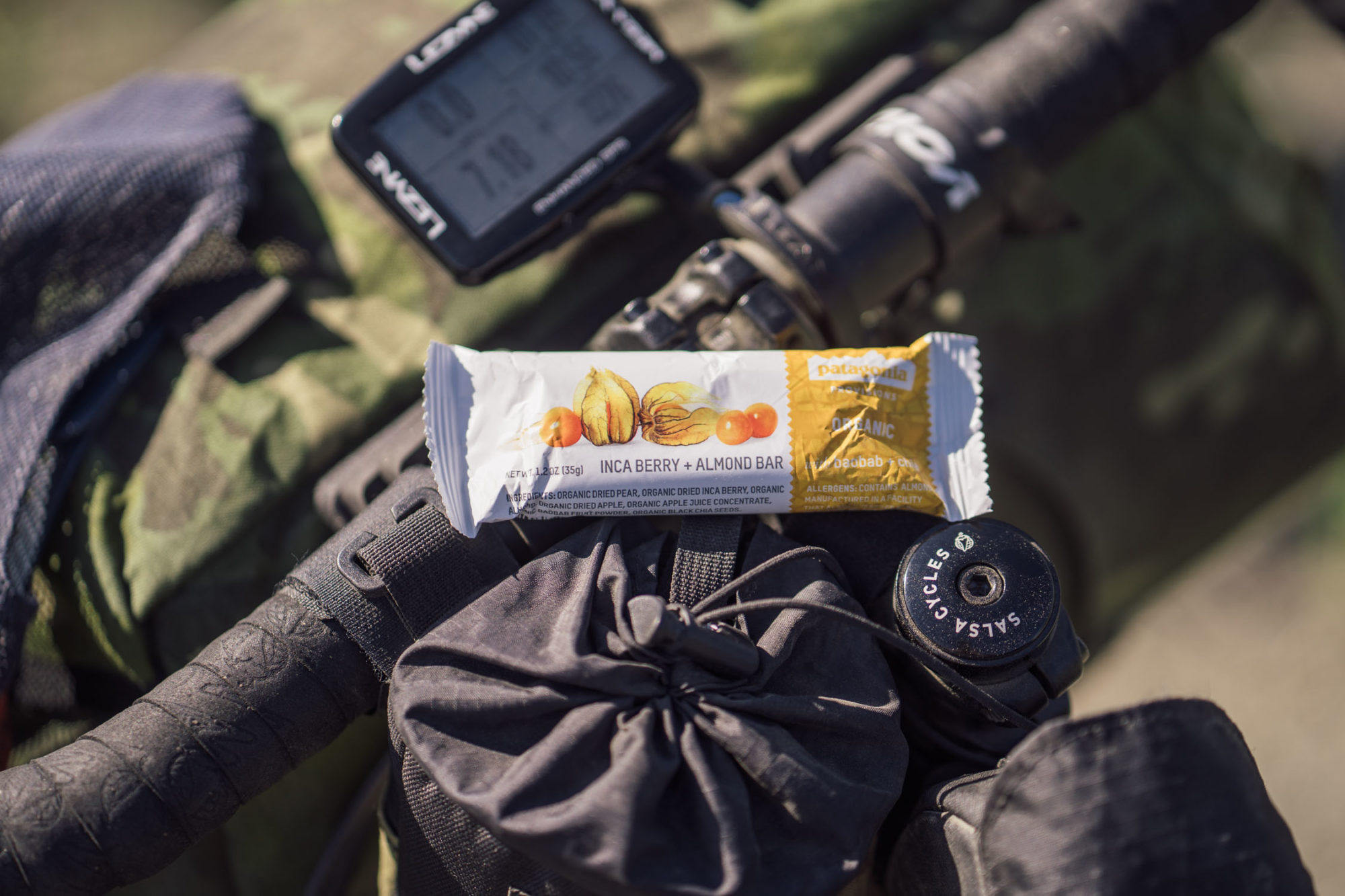
Like their other foods, the Patagonia bars’ ingredients tell the story. The mangoes are sustainably sourced in Nicaragua from farms that formerly had a lot of wasted crop. Patagonia claims that they seized this opportunity to connect these farms with the US demand for organic, dehydrated mangoes to create a fluid market channel to support this community of farmers. This was certainly our favorite of the three bars with the tart and tangy Inca Berry coming in at a close second. Bars come in 12-packs for $27, which equates to about $2.25 per bar. This certainly isn’t cheap, especially when you can get a calorie-comporable Larabar for about a buck. However, they are quite tasty and different from any other bar we’ve tried.
Meals
Patagonia Provisions offers several soups in their camp-friendly meal lineup. Each is made with their Regenerative Organic ingredients and comes in single-waste plastic packaging. That said, one thing we really appreciated with their packaging is that it’s not at all bulky like other dehydrated meals, so it’s actually less waste than most others. In addition to the ones we tried below, they also offer Tsampa Soup, Lentil Soup, and Black Bean Soup.
Organic Red Bean Chili
It seems that every camping food company has their take on chili, and there’s a good reason for that—chili is quite satisfying. Patagonia Provisions Organic (Original) Red Bean Chili is no exception. It’s vegetarian, which, in and of itself, is an environmentally conscientious alternative to meat-based chilis, but its beans are also grown using regenerative agricultural techniques. All of the ingredients, including the red and pinto beans, tomato, carrots, red bell and chipotle peppers are organic and loaded with nutritional value. Per serving, this chili provides 220 calories, 40 grams of total carbohydrates, 12 grams of fiber, and a whopping 14 grams of protein. Although we find that the 2.5 servings per package claim is a bit generous, an entire package is almost too much for one person to eat. For $7, it’s hard to beat a satisfying dinner with leftovers for breakfast.
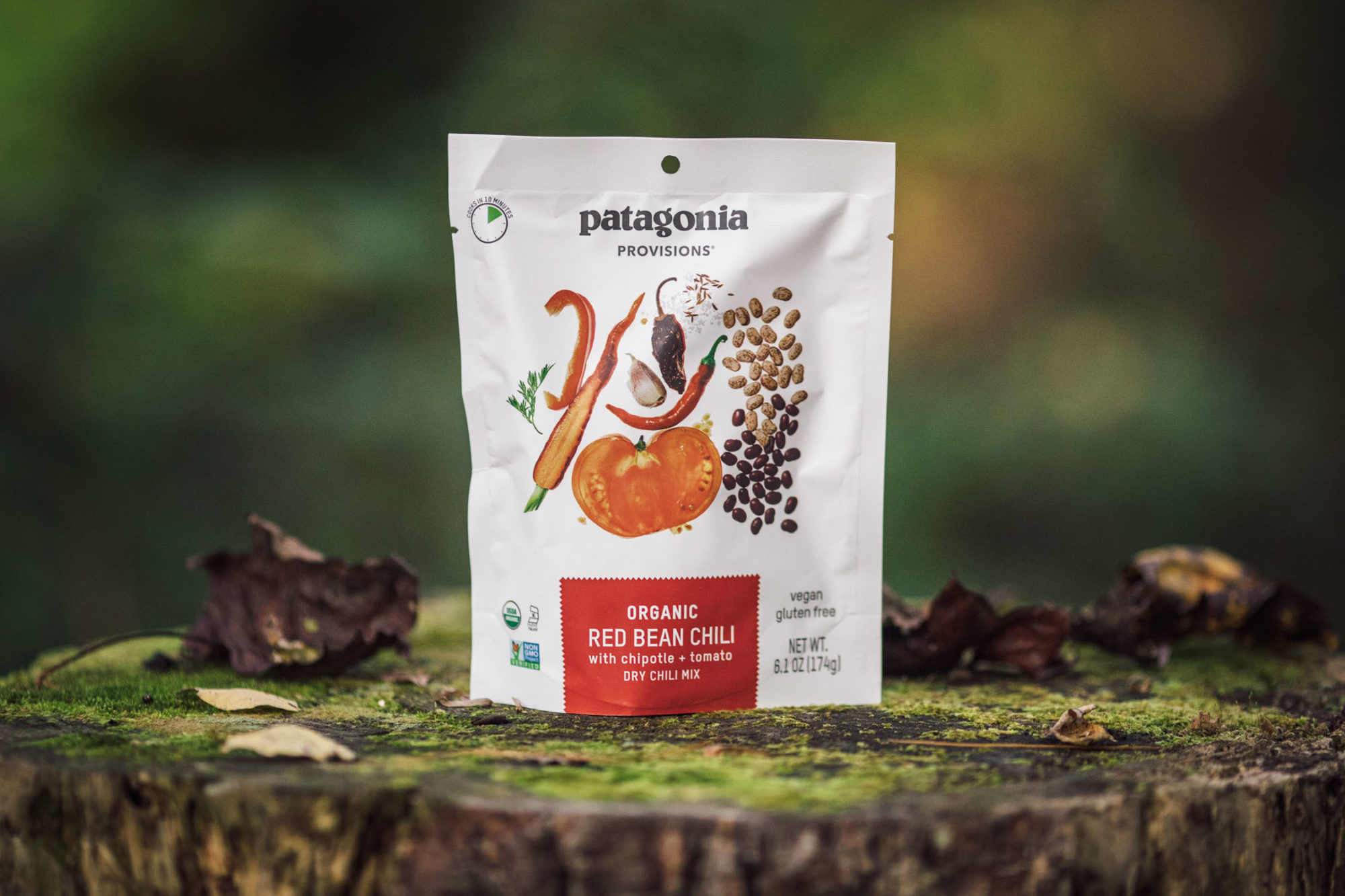
This chili isn’t only nutrient dense and filling, it’s really tasty. The flavors are rich—the tomatoes add brightness, while the chipotle peppers lend an earthy warmth that’s not significantly hot. It’s also not overly seasoned. If one prefers things a bit more fiery, the Spicy Red Bean Chili is an option. We haven’t tried it, but it contains three different chili varieties, so it’s bound to burn a bit. Otherwise, you may want to bring a little salt if you prefer your meals well-seasoned.
Savory and Breakfast Grains
Like all of the other offerings in Patagonia Provisions’ lineup, their breakfast and savory grains are grown using regenerative techniques and the ingredients are 100% organic. We tried the Organic Mushroom + Kamut Khorasan Wheat Savory Grains and the Creamy Banana Hot Cereal Mix.
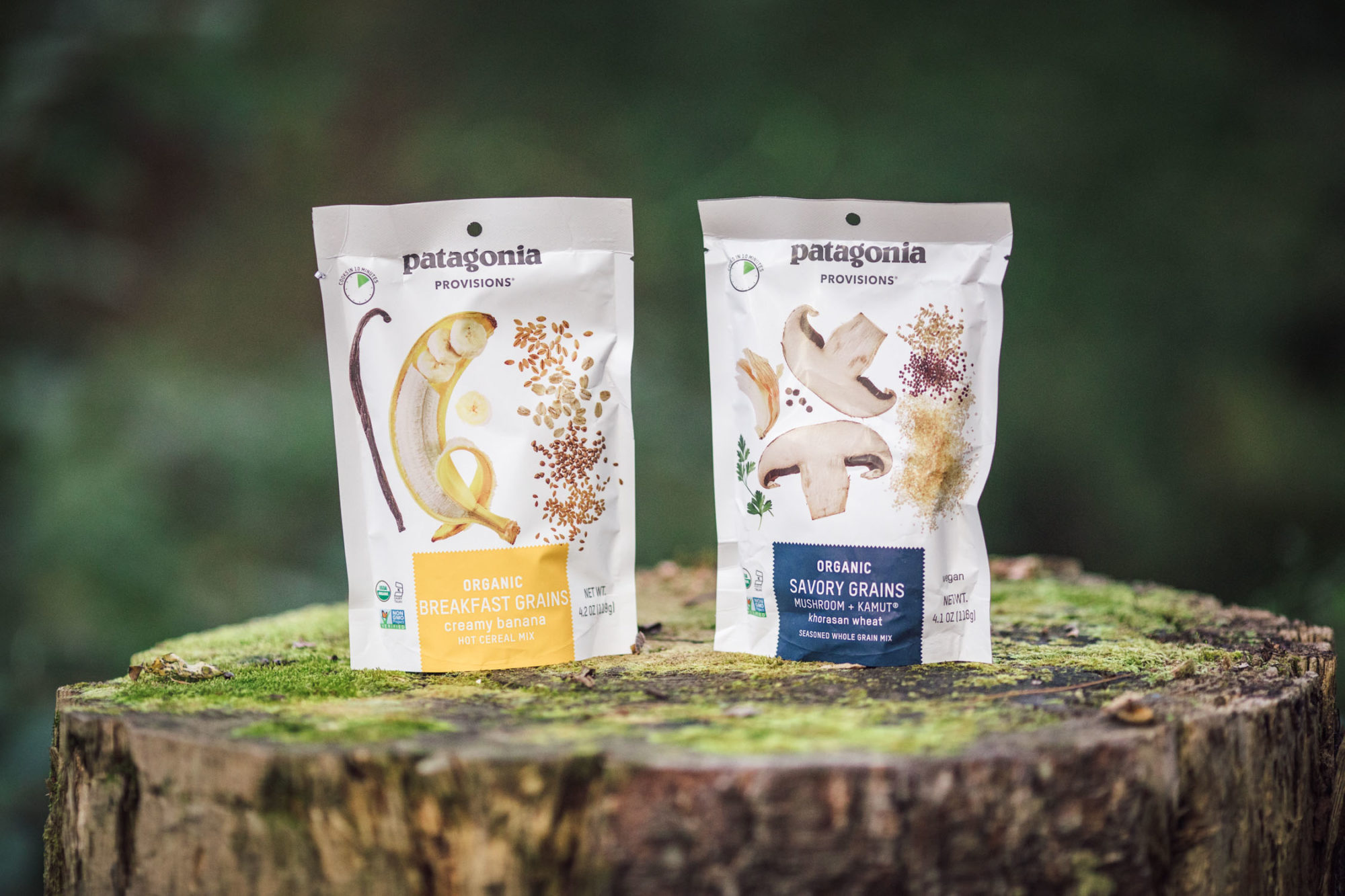
The Organic Mushroom and KAMUT® Khorasan Wheat Savory Grains are made from all organic ingredients including Kamut Khorasan Bulgur Wheat, Organic Bulgur Wheat, Organic Dehydrated Portabella Mushrooms, Organic Shiitake Mushroom Powder, Organic Red Quinoa. We were pleasantly surprised by this meal as it has a fantastic nutty and savory flavor. The package is also fairly small and lightweight. However, one pouch is a single serving size and only packs about 380 calories, so it’s not enough for a full dinner meal after a day of riding. We actually ate it for breakfast, which was quite nice and very satisfying. However, a single serving costs $7, so it’s a little expensive given the amount of calories. One serving size and contains 2.5 grams of fat, 81 grams of total carbohydrates, 12 grams of fiber, and 15 grams of protein.
The Breakfast Grains were also very good. This Creamy Banana hot cereal is made from sweet banana and several organic grains (toasted buckwheat, cracked barley, rolled oats, flax seed, and ground rice hulls). Other organic ingredients include nonfat dried milk, flax seed, vanilla powder, salt, and sunflower oil.
With no added sugar, this makes an excellent and healthy breakfast, but with only 210 calories per $7 serving, it’s quite expensive and not quite worth it over DIY cereal or oatmeal. An $18 sampler with two other flavors saves a few dollars.
Pros
- Feeling good about who/what you financially support
- Organically grown, with no risks of eating pesticides
- All of the snacks and meals we tried were very tasty
- Seafood products pack a lot of protein into a healthy and relatively low weight package
Cons
- Plastic single-use packaging
- Some items are very pricey, but maybe not when compared to other high-quality food products
- If you’re strictly looking for high calories, low weight, most of these products aren’t the best option
Wrap Up / The Downside
Patagonia Provisions is doing great work toward challenging the broken food chain. Still, even the most positive things in life have their drawbacks. In the case of Patagonia Provisions’ offerings, that shadow comes in the form of their packaging. Aside from the smoked mussels, which come in an aluminum tin that’s wrapped in cardboard, all of the other products are packaged in plastic. That’s a pretty big disappointment. This is especially true for the smaller snack items that are just that, a small snack resulting in waste that will last one-hundred years. The good news is twofold. One, the packaging they use on the larger meals is far less bulky than other dehydrated meals on the market. And, we’ve heard that Patagonia is working on creating compostable packaging. Given their track record, we think it’s only a matter of time before they come up with a more sustainable option than the one currently in place.
While we wait for someone to create a quality sustainable and economically feasible packaging solution, it’s important to keep things in perspective. Would it be better to pack meals and snacks in non single-use plastics? Of course. But the reality is that everyone isn’t going to make that effort all of the time. Sometimes convenience prevails. Patagonia Provisions snacks and meals are made with high-quality, real ingredients, and they taste great. The single-use plastics used for most of the packaging is definitely a detraction, but supporting Patagonia’s work at increasing sustainable and regenerative farming practices is a good thing, in our opinion.
Please keep the conversation civil, constructive, and inclusive, or your comment will be removed.


